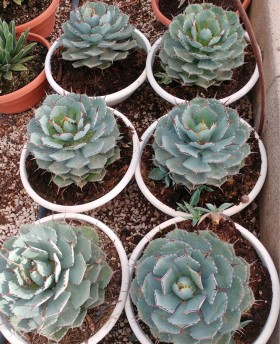





 Shipments to Spain and Portugal ...
Shipments to Spain and Portugal ...
The cost of transportation depends on the province or country.
Habitat and Distribution:
Agave potatorum grows wild in mountainous and semi-arid regions of the Mexican states of Oaxaca, Puebla, and Guerrero, mainly between 1,000 and 2,000 meters above sea level. It prefers well-drained soils and dry climates, with temperatures that can vary significantly between day and night.
Morphology:
This plant forms a medium-sized basal rosette, rarely exceeding 60 cm in diameter. Its leaves are thick, triangular, pale green to bluish-gray, with wavy edges adorned with small spines and a strong dark terminal spine. One of its most notable features is its almost geometric shape, which makes it very attractive as an ornamental plant.
Flowering and Life Cycle:
Agave potatorum is monocarpic, meaning it flowers only once in its lifetime. Upon reaching maturity (which can take between 8 and 15 years), it develops a flowering stalk, or "quiote", that can exceed 3 meters in height. After flowering, the mother plant dies, although it usually leaves behind basal pups that continue the cycle.
Traditional and Economic Uses:
One of the most prized varieties of Agave potatorum is Tobalá, used in the production of artisanal mezcal. This wild agave contributes complex and unique flavors, highly valued by master mezcaleros and connoisseurs of this traditional beverage. However, due to its slow growth and increasing demand, Tobalá faces the risk of overexploitation, making its cultivation and conservation essential.
Conservation:
Agave potatorum has been classified as a vulnerable species in some regions, particularly due to pressure from mezcal production and habitat loss. There are currently controlled cultivation and reforestation projects aimed at protecting this species without hindering its economic use.
Specific References
You might also like